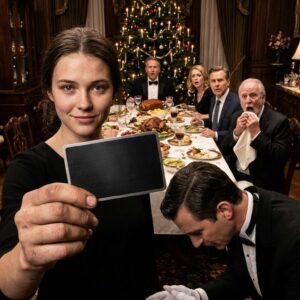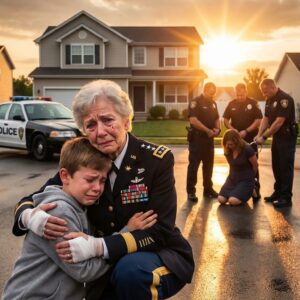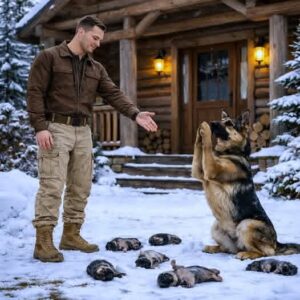On the edge of a sprawling American city, where the freeway roared like an endless ocean and the landfill rose like a man-made mountain, there was an old RV that looked like it had forgotten how to move.
The paint had peeled away years ago. One of the windows was patched with duct tape and a piece of plastic from a broken “For Sale” sign. The license plate was so faded you could barely tell it ever belonged to any particular state. It had been parked behind the recycling center for so long that the weeds around its tires had grown tall and wild, as if trying to root it into the earth.
Inside that RV lived Larry Johnson, age sixty-five, former mechanic, current invisible citizen of the United States of America.
It wasn’t his dream home. Not by a long shot. But it was four walls, a roof that didn’t leak too badly, and a door that locked. In the world Larry lived in now, that put him ahead of a lot of people.
Morning came in through the cracked blinds, thin and dusty. A truck slammed its tailgate somewhere in the lot, and the smell of garbage and gasoline drifted through the air. Larry woke up slowly on the narrow bed in the back of the RV, listening to the familiar sounds of the city waking up—horns on the freeway, seagulls circling the landfill, the rumble of a freight train out near the river.
He blinked a few times, pulled himself upright, and winced when his knees protested. Sixty-five wasn’t what it used to be, he thought. Or maybe it had always felt like this and he just hadn’t been paying attention before life knocked him off track.
He swung his legs over the side of the bed, his feet landing on the worn rug he’d salvaged from a dumpster behind a furniture store. On the counter beside the tiny sink sat three treasures: a chipped blue mug, a jar of instant coffee, and a bag of sugar he’d managed to stretch far longer than the label recommended.
He turned on the small propane burner and heated water in a dented pot, the way he did every morning. As the water steamed, he caught his reflection in the little mirror above the sink.
Same man he’d always been, more or less. Gray stubble, brown eyes, lines carved deep around his mouth. A baseball cap with a faded logo from an auto shop that didn’t exist anymore. He could still see traces of the younger version of himself there—the one who’d worked long hours under hoods of pickup trucks, who’d had a mortgage, a family, a future.
He poured hot water into his mug, stirred in coffee and sugar, and stepped outside.
The sun was already warm in the July sky. In the distance, American flags fluttered over a row of car dealerships. Closer, the chain-link fence around the city landfill glinted in the light. Seagulls screamed as they circled overhead, fighting over scraps.
“Morning, Larry,” called a voice from across the lot.
It was Pete, another man from the small homeless community that had formed around the recycling center. He slept under an old loading dock with a pile of blankets and a weather-beaten backpack.
“Morning,” Larry answered, lifting his mug in greeting.
To most people, Larry Johnson was just another old man who’d slipped through the cracks. To the folks who lived out here with him, he was something else: the guy who could fix anything.
He hadn’t planned it that way. It just happened.
He’d been a mechanic his whole life, the kind of man who could listen to an engine and tell you what was wrong with it the way a doctor could listen to a heartbeat. Even after he’d lost his home and ended up in the RV—long story, full of words like layoff and hospital bills and foreclosure—his hands still remembered what to do.
It started with someone handing him a broken watch they’d found in a trash bin. He took it apart on his tiny table by the window, cleaned the gears, put it back together. The watch ticked again.
Word spread.
Soon people were bringing him old alarm clocks, busted radios, fans with blades that wouldn’t spin. Toasters, blenders, a hair dryer that smelled like burned plastic. Larry fixed them all. Sometimes the things worked better than they had when they were new.
Those who managed to sell the repaired items at flea markets or parking lot sales always returned to share. Most of them were honest about it, or at least they tried to be.
Most of them.
Larry didn’t drink like many of the other men did. If he took a sip of something strong, it was only when his arthritis flared up and another night on the narrow mattress felt like a cruel joke. For the most part, he stayed clear-headed and steady, and that alone earned him a kind of quiet respect out here.
He didn’t talk much about his past. Not about the small house on a quiet street, or the woman named Rachel who used to lean in the doorway with a dish towel in her hands and tell him dinner was ready. Not about the daughter who grew up and moved on with a man who thought the word “family” meant “cash out.”
The past hurt. So Larry tried not to live there.
He was sipping his coffee and watching a freight train crawl along the tracks when he saw Frank trudging toward him, hunched under the weight of something large and heavy.
Frank was built like a refrigerator with arms. His beard was wild, his baseball cap stained and crooked. He dragged his treasure behind him on a piece of cardboard like a sled.
“Hey, Larry!” he puffed. “Got something for you, man. This one’s a beast.”
Larry set his mug on the RV’s step and walked over. “What in the world did you drag in this time?”
Frank grinned and dropped the load with a thud. It was an old television set—huge, boxy, the kind of thing people had in living rooms before flat screens took over America.
“Found it near the dumpsters behind that thrift store on Jefferson,” Frank said proudly. “Almost intact. They must’ve been too lazy to strip it for parts. Look at this thing. When they sold these, they hadn’t even heard of plasma yet.”
The TV’s plastic shell was yellowed with age. A spider had spun a web in the hollow where the cable used to plug in. Larry squatted down, pressed his hands against his knees, and studied it.
“What do you want from me?” he asked bluntly. “This dinosaur ain’t worth fixing. Nobody’s gonna sit around watching this when you can get a flat screen for two hundred bucks at Walmart.”
“Yeah, yeah, I know,” Frank said. “But the parts, man. Copper, some reusable boards… I figured you could take it apart. I’ll haul the good stuff to the flea market on Sunday. We split it fifty-fifty, like always.”
“Like always,” Larry repeated, though he knew “fifty-fifty” usually meant “twenty-eighty,” with him on the wrong end of the math.
Frank wiped sweat from his forehead. “And hey,” he added, “if it pays off good, I’ll grab you a little bottle of whiskey. Top shelf. Not the cheap stuff.”
Larry chuckled. “You keep the bottle. Just bring me some decent coffee next time.”
Frank laughed, clapped him on the shoulder, and headed off, whistling.
Larry dragged the TV closer to the RV. The sun beat down on the parking lot, the asphalt shimmering with heat. He decided to work right there, next to the door, rather than haul the heavy monster inside.
He fetched his tools from the small plastic bin under his bed—screwdrivers, pliers, a multimeter that had somehow survived more falls than he cared to remember—and got to work.
Removing the back cover took effort. The screws were stubborn, the plastic brittle from years of being ignored. When the panel finally came off, Larry coughed as a puff of dust exploded into the air.
“Someone forgot what a vacuum cleaner is,” he muttered, squinting at the guts of the TV.
Circuit boards, wires, a transformer the size of a small brick. It was like stepping back in time to the days when electronics in American living rooms came with weight and personality.
He reached for a soft-bristle brush and began sweeping away dust. That’s when he saw it.
In the upper corner of the TV case, wedged between a board and the inner wall, was a lumpy bundle wrapped in clear plastic and layers of duct tape.
Larry froze.
“Well, now,” he whispered. “What are you?”
He glanced around instinctively. Nobody was watching him. Pete was digging through a bag a few yards away. A truck rumbled past on the road, oblivious.
Larry reached in carefully and eased the bundle free. It was heavier than it looked. Heavy in a way he recognized.
His heart thumped.
He sat on the RV’s step and picked at the tape until he felt his patience evaporating. Then he used his pocketknife to slice through.
The plastic peeled away. Something glittered in the sunlight.
Gold.
Rings. Brooches. A thin chain. They tumbled into his calloused palm and slid to the ground with a soft, musical clink.
Larry’s breath caught in his throat.
“Dear Lord,” he breathed. “What kind of gift is this?”
His fingers brushed against something else in the bundle—a thick stack of paper held together with a tight rubber band.
He pulled it out.
Hundred-dollar bills. Fresh, crisp, American currency, the kind he hadn’t touched in years except in the form of worn ones and fives at the grocery store.
He flipped through the stack, hands trembling. It wasn’t just a few bills. It was… a lot.
Enough to eat well for a long time. Enough to pay for a small room somewhere, at least for a while. Enough to get his teeth checked, his medications refilled, maybe even see a doctor who didn’t work out of a clinic waiting room that smelled like bleach and fear.
His mind flooded with images. A new pair of boots. A warm coat for winter. A mattress that didn’t ache. A storage unit so he didn’t have to worry the city would tow away his RV and everything in it.
He swallowed hard.
And then a second thought pushed its way in.
This isn’t yours.
Neither was the TV. That hadn’t stopped him from planning to strip it down and sell its innards. But an old TV left by the dumpster wasn’t the same as a carefully wrapped bundle of money and gold hidden inside it.
Whoever owned this had hidden it. On purpose.
He looked back at the TV. Yellowed plastic, dust, obsolete electronics. It must have sat in someone’s living room once, broadcasting sitcoms and game shows and American news anchors with perfect hair. Then it had gotten old, moved to a spare room, then maybe a basement. Then someone had thrown it out.
He thought about Frank, about the way the man’s eyes always seemed a little too greedy when they landed on something valuable.
Larry exhaled slowly.
“I’ll just… hang on to this for a bit,” he muttered. “Figure it out later.”
He slid the gold and the cash into an old metal toolbox he kept under the bed—a box so ordinary nobody would ever think to look twice at it. The weight of the money felt like a cinder block in his chest.
With the treasure hidden, he returned to the TV. Took it apart piece by piece. Salvaged what he could.
A while later, when the sun moved higher in the sky and his stomach reminded him it had only had coffee that day, Larry grabbed a few bills—only a few—from the stash and headed toward the supermarket down the road.
He walked along the sidewalk, passing a used car lot with red, white, and blue flags fluttering above it, a laundromat with faded signs, a fast-food place where the smell of fries lingered in the air. The asphalt radiated heat. The hum of highway traffic never stopped.
He was humming a tune under his breath, something from the radio back when radios had real dials, when he noticed her.
A woman sat on a bus bench near the corner, a plain canvas bag at her feet. She looked like she was in her early sixties. Her gray hair was neatly pulled back, but her shoulders were shaking. She pressed a handkerchief to her eyes again and again, as if she could wipe away whatever had hurt her.
Larry slowed.
He didn’t usually involve himself in other people’s tears. Out here, everyone had their own tragedy, and if you tried to carry them all, you’d break in half. But something about the woman’s face—the raw grief, the way she was clearly trying to hold herself together and losing the fight—stopped him.
He stepped closer.
“Ma’am?” he asked gently. “You okay? Is there anything I can help you with?”
She looked up, startled.
Her gaze flicked over his worn jeans, the shirt he’d washed but couldn’t quite get the stains out of, the sun-creased skin, the ball cap pulled low. She saw the homeless man. The American nobody.
But she didn’t flinch. She just sniffled and tried to muster a smile.
“Thank you,” she said hoarsely. “But I don’t think there’s anything anyone can do.”
“You’d be surprised,” Larry replied. “Sometimes strangers can do more than family.”
That made something in her expression crack. She let out a shaky breath.
“My son’s wife,” she said slowly, “cleaned out the garage this morning. She meant well… she said she was decluttering. She took an old TV to the trash. It was a big one. Ugly thing. Must’ve been thirty years old. She didn’t know…”
Her voice broke.
“Didn’t know what?” Larry asked, though his heart already knew.
“She didn’t know that I had hidden all my savings in there,” the woman whispered. “Gold jewelry from my mother. Some cash I put away over the years. I never trusted banks after… well, after everything. It was all I had. And she… she threw it away.”
She started to cry again, pressing the handkerchief to her face.
Larry’s stomach dropped. He could almost hear the click of fate’s gears lining up.
“Ma’am,” he said carefully, “was this TV really old? Big back, heavy. Looked like something from the eighties?”
She froze. “Yes,” she said. “Do you… do you know something about it?”
Larry stared down at the cracks in the sidewalk. This morning he’d thought he’d found a miracle. Now it felt like a test.
“I think I do,” he said quietly. “I found that TV. A friend of mine brought it to me to take apart. There was a bundle inside. Wrapped up good. Gold. Cash.”
The woman’s hand dropped from her face. “Oh my God,” she whispered. “Are you serious? Is it… is it still…?”
“I haven’t spent a dollar,” Larry said quickly. “It’s back at my RV. If that’s your stash, then it’s yours. All of it.”
He gestured toward the lot. “My place is just a little ways back. Come on, let’s go get it before I start getting ideas.”
She let out a breath that was half sob, half laugh, and stood shakily. “Thank you,” she said. “Thank you so much.”
They walked together past the recycling center and around the back to the battered RV. Down the hill, the American flag over the car dealership still fluttered in the hot wind. Trucks lined up near the landfill scales. It was just another day in the city.
Inside the RV, Larry reached under his bed, slid out the metal toolbox, and set it gently on the table. He opened it and pulled out the bundle, still wrapped except for the one corner he’d torn earlier.
The woman’s hands flew to her mouth.
“Yes,” she breathed. “That’s it.”
Carefully, he placed it in her hands. She peeled back the plastic, saw the gold, the cash, and burst into tears again—this time from sheer relief.
“I’m so sorry,” Larry said, suddenly aware of how close he’d come to walking away with something that wasn’t his. “I didn’t know. I was… I was stupid. I thought it was some kind of… I don’t know, gift from the universe.”
“You brought it back,” she said, wiping her eyes. “That’s what matters. Most people wouldn’t.”
She pulled out a few hundred-dollar bills and held them toward him.
“Please,” she said. “Take this. It’s the least I can do.”
Larry’s first instinct was to refuse. He didn’t deserve it. He’d already spent the morning mentally spending money that wasn’t his.
But then he looked into her eyes. They were kind, exhausted, and sincere. She needed to feel that she’d given something back, that this moment wasn’t one-sided charity.
“All right,” he said quietly. “Thank you, ma’am.”
“My name is Miranda,” she said, smiling through tears. “And I don’t know how to thank you enough.”
“You just did,” Larry replied.
After she left, walking back toward Main Street and whatever waited for her there, Larry sat alone on the little built-in bench and stared at the empty toolbox.
The treasure had come and gone in one day. Just like that.
He felt a strange mix of disappointment and… peace.
Maybe some things weren’t meant to be kept. Maybe the universe had decided that the gold had already chosen its owner long before Larry ever happened to open that TV.
One thing he knew: he couldn’t get Miranda’s face out of his mind.
Her shoulders weighed down by more than the heat. The way she’d held that bundle like it was not money, but survival. The way something softened when she’d looked at him, as if she recognized another person who’d had life pulled out from under him.
Days passed.
Larry went back to repairing radios and fans and toasters, back to his routines of collecting cans for recycling and stretching every dollar as far as it could go. The few bills Miranda had given him went to groceries and a refill of his pain medication.
He didn’t expect to see her again.
On a quiet afternoon about a week later, someone knocked on the RV door.
Larry, who’d been bent over a broken blender, groaned. “If that’s you, Frank, and you brought me another TV, I swear—”
He opened the door.
And froze.
“Hello, Larry,” Miranda said shyly.
She stood there with a plastic grocery bag in her hands. She was wearing a simple blouse and slacks, the kind of clothes a woman her age might wear to church or to the store. Her hair was pulled back in the same neat way. Her eyes crinkled at the corners when she smiled.
“Miranda,” he said, genuinely startled. “What are you doing here?”
“I brought you something,” she said, lifting the bag. “I… I made it myself.”
He caught a whiff of it. Savory, warm, homemade.
“Well, now,” he said, grinning despite himself. “That smells better than anything that’s come out of this parking lot in a long time.”
“There’s a chicken pie in here,” she said, a little flustered. “And an apple pie. And a bottle of lemonade. I didn’t know what you like, so I just… made everything.”
“You didn’t have to do that,” Larry said. “You already paid me more than enough.”
“It’s not about the money,” she said softly. “You did something kind for me. I wanted to do something kind back. May I… come in?”
He stepped aside quickly. “Of course. Forgive the mess. I don’t have a maid service out here.”
She laughed and ducked inside. The RV suddenly felt smaller, but in a good way. Fuller.
Larry cleared a space on the little table. Miranda unpacked the bag—one steaming chicken pie, golden brown on top; one apple pie with a flaky crust; one glass bottle of pale yellow lemonade with slices of lemon floating inside.
“I can’t remember the last time I had a real home-cooked meal,” Larry admitted, almost embarrassed by how hungry he suddenly felt.
“Then sit,” Miranda said. “Eat. We can talk while you do.”
He didn’t need to be told twice. He cut into the chicken pie, the crust breaking with a soft crunch, savory steam rising into the air. Potatoes, carrots, tender pieces of chicken in creamy sauce. It smelled like every Sunday dinner he used to take for granted.
He ate, trying not to inhale it. Miranda watched him with a look that was part concern, part satisfaction. When he moved to cut into the apple pie, she poured lemonade into his chipped blue mug.
When he finally sat back, full for the first time in months, she took a breath.
“I didn’t just come to bring food,” she said quietly. “I… I need your advice.”
Larry tilted his head. “My advice? That’s a dangerous request.”
“You seem like an experienced man,” she replied. “You’ve been through things. You understand the world in a way my son doesn’t. Maybe in a way I don’t.”
She wrung her hands in her lap. “My son, Kevin, wants to sell the house. The one on Main Street. He says the market is hot, that we could get a lot for it, then buy something smaller with the money and go our separate ways. He wants to move his wife closer to her family in another town. He says I can use part of the money to find a little place or…” She hesitated. “Or a senior home.”
Larry’s jaw tightened. He’d heard this story before. He’d lived this story before.
“What do you think?” she asked. “Honestly.”
He looked at her, at the worry lines on her face, at the way she was brave enough to ask.
“I think you should be very careful,” he said slowly. “Ten years ago, my wife Rachel died. Cancer. Three months after the funeral, my daughter and her fiancé started talking about selling my house. Said it was too much for me to take care of. Said it would be easier if we all ‘downsized.’”
He stared at his calloused hands.
“I signed the papers,” he continued. “Trusted them. Thought, ‘They’re my family. They’ll look out for me.’ A month later, I was sleeping in my car. That car broke down. I found this RV behind a shop, bought it for next to nothing, and I’ve been here ever since.”
Miranda stared at him, horrified. “But Kevin isn’t like that,” she said quickly. “He wouldn’t… He’s my son. He wouldn’t put me on the street.”
“I’m not saying he will,” Larry said. “I’m saying once you hand over the house, you lose a lot of power. You lose your safety net. Make sure that if you do it, you have everything in writing. Make sure you’re not depending on promises that can change when someone gets tired or when bills pile up.”
She looked away. “His wife thinks I’m in the way,” she admitted. “She doesn’t say it outright, but I can feel it. I’m… ‘old-fashioned.’ I don’t fit their lifestyle, she says. I still like real books. Quiet evenings. She likes loud music and friends over all the time. Maybe it would be easier if I just… let them go.”
“You deserve more than ‘easier,’” Larry said bluntly. “You deserve safe.”
Miranda’s mouth trembled. “I thought you’d tell me I was being silly,” she said. “That I should support my son, make sacrifices.”
“I’ve made enough sacrifices for one lifetime,” Larry said. “So have you, I’d bet.”
Her eyes shimmered. For a moment, the air between them felt heavy.
“Well,” she said after a long pause. “Thank you for your honesty.”
He realized too late that his words had landed like a stone instead of a cushion.
“I didn’t mean to upset you,” he added quickly. “I just—”
“No,” she said, standing. “It’s better to hear the truth. Even when it’s uncomfortable.”
She forced a small smile. “Thank you for the meal,” he said. “It was the best thing I’ve eaten in ten years.”
“And thank you for listening,” she replied. “Even if I didn’t like what I heard.”
She gathered her empty bag and stepped toward the door.
“Miranda,” he said, wanting to call her back, to soften his answer, to tell her he hoped he was wrong. But the words stuck.
She left.
Larry stood in the doorway, watching her walk back toward the city. He wanted to run after her, to say, “Forget what I said, your son will be different,” but he couldn’t lie to her. Not after everything.
Days turned into weeks.
Every time someone knocked on the RV door, Larry’s heart jumped, hoping it was Miranda. It never was. It was always Frank with another broken gadget, or Pete needing a battery, or someone asking if he’d seen their shopping cart.
After a month, he told himself it was over. She had made her choice. Maybe things had worked out. Maybe she’d decided to trust Kevin and it had gone fine. Maybe she’d never think of the old man in the RV again.
Then, one gray afternoon, when the sky looked like it might finally break and pour rain over the hot American pavement, someone knocked on his door three times. Soft. Hesitant.
Larry opened it.
Miranda stood there, gripping the handle of a large travel bag. Her clothes were different—more worn, more wrinkled. Her shoulders looked heavier. But her eyes were the same.
“Will you let me stay the night,” she asked quietly, “or should I go find a park bench?”
Larry’s heart dropped. “Come in,” he said immediately, stepping aside. “Please. Come in.”
She stepped into the RV, set down her bag, and exhaled as if she’d been holding her breath for weeks.
“What happened?” he asked gently.
She sat on the narrow bench and stared at her hands.
“You were right,” she said. “About everything.”
She told him the story in a flat, tired voice.
She’d agreed to sell the house. Kevin had convinced her it was for the best. The market was high. They’d all win. Papers were signed. Papers she hadn’t fully understood but had trusted because they were shoved at her by people she loved.
The check came. Debts were paid. Plans were made.
Then Kevin’s wife started talking about a condo in another city, near her job. “We’ll get something for you too, Mom,” Kevin had said. “Just as soon as everything settles.”
Everything “settling” turned out to mean that they needed more space, that prices were higher than expected, that they had to prioritize their own future first. Maybe she could stay with a friend, or check out some affordable senior housing options. They’d help her look. Later.
“I didn’t want a fight,” Miranda said. “I didn’t want to be the reason my son was stressed. So I packed a bag. I thought maybe I’d figure it out. Then I remembered you. And this place.”
She laughed softly, a bitter sound. “I guess I’m homeless now too.”
“Yeah,” Larry said quietly. “That’s too bad. But you’re not alone. Not anymore.”
He looked around his tiny RV. It wasn’t much. It wasn’t what a woman like Miranda deserved. But it was better than a bench.
“You can stay here as long as you like,” he said. “We’ll figure something out.”
She shook her head. “I only need to stay one night,” she said.
“That’s not nearly enough,” he replied.
“I mean,” she continued, “I only need to stay one night here. Because tomorrow… I want you to come with me.”
Larry blinked. “Come with you where?”
“To Kentucky,” she said.
He stared.
“I have a house there,” Miranda explained. “A small one. Old. It belonged to my grandmother. She left it to me in her will. My son and his wife don’t know about it. It’s in a town nobody pays attention to. There’s a porch and a yard with trees. It’s not a mansion, but it’s a real home. And it’s empty.”
She met his eyes, her gaze steady now.
“I don’t want to live there alone,” she said. “I don’t want to start from scratch by myself again. You’re kind. You’re honest. You returned my savings when you could have kept them. You told me the truth about my son when nobody else would. I feel safe with you, Larry. So I’m asking… would you come to Kentucky with me? Move in. Start over. We can split the bills. You can fix things around the place. I can cook. We can… try to be a family.”
His vision blurred.
Of all the things he thought she might say, this wasn’t one of them.
“Miranda,” he said, his voice rough, “are you sure?”
“I’ve never been more sure of anything,” she said simply. “I don’t have much left in this city. You don’t either. Maybe it’s time to go somewhere that doesn’t see us as clutter.”
He laughed, a short, disbelieving sound. Tears pricked at the corners of his eyes, hot and unexpected.
“I’d follow you to the end of the Earth just for another one of those chicken pies,” he said finally.
She laughed through her own tears.
“Good,” she said. “Because I make a mean breakfast too.”
They left the city the next day.
Larry packed everything he owned into Miranda’s car, an old but sturdy sedan with Kentucky plates that had been sitting in her garage until the house sold. The RV stayed behind, empty and still, the weeds already reaching for the space its tires left in the dirt.
As they merged onto the highway, the city skyline shrank in the rearview mirror. The landfill, the recycling center, the car dealerships with their stars and stripes banners—slowly they disappeared, replaced by open road and wide American sky.
They drove south and east, past cornfields and truck stops, rest areas with vending machines that hummed in fluorescent light, billboards advertising fried chicken and roadside attractions. They crossed state lines marked by signs that welcomed them with colorful slogans.
“Well,” Larry said when they saw the sign that read “Welcome to Kentucky,” “I guess this makes it official.”
“I guess it does,” Miranda replied, smiling.
The house in Kentucky wasn’t big. It sat on a quiet street lined with trees, the paint on its wooden siding faded but not peeling. There was a small porch with two steps, a front door with a brass handle, and a yard where birds hopped in the grass.
To Larry, it looked like something from a postcard. Like the kind of place where people grilled on weekends and kids rode bikes in the driveway. The kind of place he’d lost once and never dared hope to have again.
They cleaned. Fixed leaky faucets. Patched a bit of roof. Larry repaired the old stove, got the heater working properly, and rewired a couple of outlets that had gone questionable over time. Miranda unpacked boxes of dishes and faded mugs, curtains that smelled faintly of her grandmother’s house.
Days settled into a gentle rhythm.
In the mornings, the sunlight slipped through lace curtains instead of cracked blinds. The air smelled like wet grass and coffee instead of exhaust and garbage. Larry woke up in a real bed in a small room with a window that looked out over a maple tree. He could hear birds instead of freight trains.
Miranda made breakfast—eggs, toast, sometimes pancakes on Sundays. They ate at a real table, with chairs that matched.
In the afternoons, Larry tinkered in the garage, turning it into a small workshop. Neighbors heard about the man who could fix anything and started bringing things by—broken lawnmowers, old radios, a chainsaw that refused to start. He never charged much. Often they paid him in pies, fresh vegetables, or just their gratitude.
Sometimes, when they sat on the porch in the warm Kentucky evenings, sipping iced tea and watching fireflies blink in the yard, they talked about the strange path that had brought them there.
“Imagine,” Miranda would say, shaking her head with a smile, “that it all started with an old TV.”
“A TV and a very stubborn son,” Larry would add.
“And a very stubborn old mechanic,” she’d reply.
They laughed.
The pain of what they’d lost never vanished completely. Grief has a way of settling into the corners of a person’s heart and staying there. But it grew quieter. Softer. It had to make room for other things—like comfort, and gratitude, and the unfamiliar feeling of being chosen, even after the world had tried to discard them.
They didn’t call themselves anything official. They didn’t need to. Neighbors simply referred to them as “Miranda and Larry down the street,” the couple in the small house with the bright porch light.
They had no ceremony, no paperwork. Just two people who’d spent years being treated as burdens and finally decided to be blessings to each other instead.
Sometimes, late at night, when the house was quiet and the only sound was the crickets outside, Larry would lie awake and think about the RV parked behind the landfill, the gold he could have kept, the life he almost chose.
Then he’d feel the warmth of the house around him, hear Miranda’s soft breathing down the hall, and he’d smile in the dark.
In an abandoned TV in some American city, someone once hid a fortune. But the real treasure had been waiting somewhere else entirely—in a stranger on a bus bench, in an honest decision, in a simple invitation:
“Will you go to Kentucky with me?”
Larry Johnson had lost everything. Then, in the most unexpected way, he’d found more than he ever thought he’d have again.
And every time Miranda pulled a chicken pie out of the oven and the whole house filled with that rich, savory smell, he silently thanked fate for that old television, that hot July morning, and the country that was big enough and wild enough to give a man like him a second chance.





